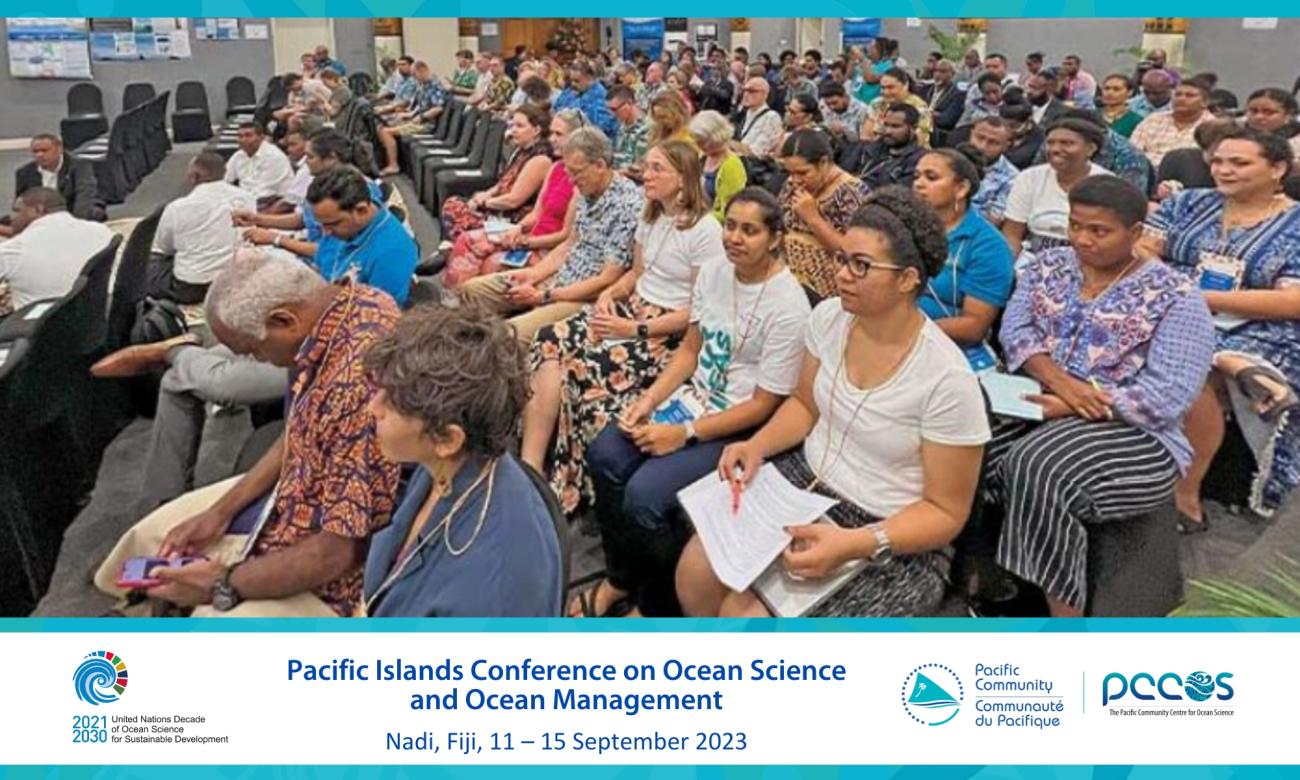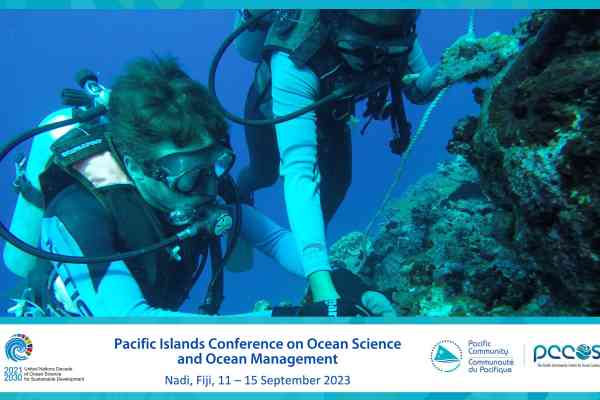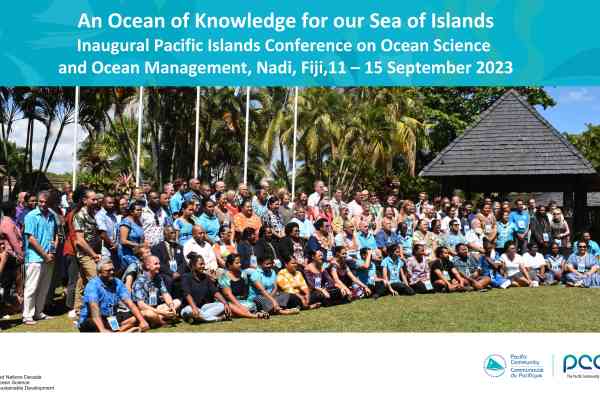(contenu disponible en anglais uniquement)
Telling The Best Ocean Stories That Are Never Being Told
Opinion by Stanley Simpson, Mai TV
The latest in Pacific scientific research and excellence, integrating with centuries-old Pacific traditional knowledge to manage and sustain our oceans was the highlight of discussions at the Pacific Islands Conference.
The latest in Pacific scientific research and excellence, integrating with centuries-old Pacific traditional knowledge to manage and sustain our oceans was the highlight of discussions at the Pacific Islands Conference on Oceans Science and Ocean Management that was held this week in Nadi.
There were 200 delegates and 155 speakers, with organisers the Pacific Community (SPC) noting that the conference was the “first of its kind in the Pacific.
It brought together ocean scientists, technical experts, policymakers, young people, and custodians of traditional knowledge to address vital issues concerning the Pacific Ocean and its region is facing, under the theme “An Ocean of Knowledge for our Sea of Islands.”
The scientific developments, research, data, expertise, ideas, concepts, investments, advocacy, solutions and initiatives for the Pacific ocean – by various stakeholders including scientists, universities, regional agencies, policy makers, conservation groups, research groups, indigenous groups, activists and thinkers – were impressive, exciting and inspiring.
It is evident that Pacific scientists are at the forefront and leading the way on some key ocean issues, research and developments, and we have internationally highly regarded experts from the Pacific on ocean management.
At the same time, we lag behind on addressing some critical ocean challenges, and are not connecting these research and data being collected into a focused collaborative process amongst key stakeholders.
It is also evident that there is a big gap and disconnect between the groundbreaking work being done by our experts nationally and regionally and the coverage, awareness and understanding of the general public regarding developments and issues facing the Pacific Ocean.

Participants of the Pacific Islands Conference on Ocean Science and Ocean Management at the Tanoa International Hotel in Nadi on September 11, 2023. Photo: SPC
Worrying trend
I have been in the media awhile but I didn’t know more than half the ocean experts and delegates at the conference.
Clearly, work and research in the oceans space has grown and developed immensely but almost in silence, or possibly largely within a circle of people who speak the science language, and some of the things I heard at the conference this week, I was hearing for the first time.
This is worrying and something that needs to be urgently and effectively addressed. Otherwise all this talk about the ‘Ocean Decade’ the ‘Blue Pacific’, the ‘Blue Economy’ and ‘Blue Prosperity’ and all the other Blue things will pass by the majority of the population and they wouldn’t even notice.
We have the best ocean stories that are never being told.
There is also an issue of ocean story sovereignty and telling our own stories.
Too often we have overseas journalists and writers from bigger well-funded international media organisations, and scientists and researchers from bigger well-funded international organisations and universities, coming in to tell us the stories of our ocean wonders and ocean issues.
Our tourists are better informed of our ocean wonders and attractions than we do.
I read an article in a travel magazine last year about a renowned dive and snorkeling spot an hour away from Savusavu.
The writer wrote: “Having snorkeled at the holy grail that is Indonesia’s Raja Ampat and the Ribbon Reefs on Australia’s Great Barrier Reef, I’ve been spoiled when it comes to marine experiences. But the moment I jump into the water at Namena, I’m in awe….this protected reserve and soft coral haven makes a 60sqkm loop around a small island. And its dive spots, including Grand Central Station, are considered to be among the top 10 in the world. I can certainly understand why Pixar artists came here to dive before sketching the animation for Finding Nemo.”
A world class dive spot an hour away from my hometown and I hadn’t written about it!
Lack of coverage
For islands connected by the largest ocean in the world, there is a glaring lack of coverage and media content on our oceans even as half the population of Pacific peoples live within 10km of the coast, and this jumps to 97 per cent if we exclude PNG.
It occurred to me that because of National Geographic, the Discovery and Love Nature channels on Sky Pacific, and the content we easily access on YouTube and TikTok, I knew more about polar bears, seals, killer whales, great white sharks, lions, wolves, penguins, buffaloes and crocodiles and such from the Arctic and Antarctic to the jungles and deserts of Africa, than I do about our own Pacific island ocean and marine species.
We watch stories about animals from other parts of the world told in intimate detail – from how they hunt, how they mate, how they reproduce, how they nurture their young, how they survive the various weather challenges such as droughts, and adapt to the lack of prey and food sources and such.
But we never or rarely see similar content produced about our various Pacific Ocean species and the critical work being done to conserve and sustain them.
Where is the National Geo style content on the Pacific for the Pacific?
Content that brings greater understanding and appreciation to Pacific living rooms and Pacific families about the wonder, the beauty and richness of the Pacific Ocean around them.
There are some great content being produced, but definitely not enough.
Advanced world
A number our governments and important players in the field of ocean conservation appear to be stuck in the past, creating outdated reminiscent of the 1990s.
Meanwhile, the rest of the world has advanced to creating high-quality content that not only informs but also resonates with people emotionally, motivating them to take action.
Communication budgets for programmes and projects are non-existent or too tiny to make a real difference.
So, all we continue to get are media releases after media releases that don’t capture people’s full attention or the full essence of what is taking place. Our communications specialists are providing low cost communication products and comms solutions that meet our limited budgets.
We all talk about using social media but to effectively compete in the social media space – we need to produce compelling content that capture peoples attention.
Some great content, illustrations and powerful video productions are now being produced – but dissemination to the general public is not strong enough.
What can we do?
We need to build stronger partnerships. Pointing the blame for the lack of ocean coverage and content on each other is not going to solve anything – we need to collaborate stronger for the future.
Making a difference will need strong commitments and investments in time and money. Real money. We are sending journalists who have to cover five different stories a day to cover ocean stories when we need to start developing full time ocean journalists and producers to work with our full time ocean specialists.
That seems to be the difference in the way the rest of the world is beating us in producing ocean content. We have the best storytellers available.
Over 150 of them were in that conference room in Nadi this week with compelling stories. They are passionate and they have the heart for it, although they often have a habit of disappearing when asked to do a media interview.
We can’t tell the stories well if we don’t know what our scientists are doing, and the great and amazing work of our scientists will not be known if they don’t engage our media in a meaningful way or work with content producers. And we will lose time-tested traditional knowledge, built from hundreds of years of reading nature, if we don’t capture them now.
Some of government’s public service broadcast funds can be allocated to produce these public interest content and inspire partnerships.
If 2021 – 2030 is going to be the Ocean Decade then lets really make it an Ocean Decade. A decade that makes a real difference.
*****
Stanley Simpson was a participant/fellow of The Pacific Community (SPC), Pacific Islands News Association (PINA), Fiji Media Association (FMA) and Internews Earth Journalism Network Ocean Science and Ocean Management Media Masterclass in September 2023 in Nadi, Fiji.



